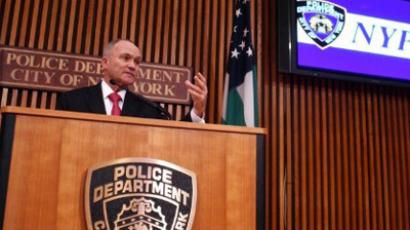Federal judge says it’s okay for the NYPD to spy on Muslims

A federal judge this week dismissed a lawsuit against the New York City Police Department and said that the covert NYPD operation that sent undercover officers into area mosques to conduct surveillance on innocent Muslims was not unconstitutional.
United States District Judge William Martini — a George W. Bush appointee — opined in a 10-page decision published late Thursday that the June 2012 lawsuit against the NYPD must be dismissed due in part to lack of standing with respect to the plaintiffs: a coalition of six Muslim individuals, two organizations that operate mosques, two Muslim-owned businesses and the Rutgers University Muslim Student Association.
The nearly two-year-old court case surrounded allegations that the plaintiffs were targeted by a once-secret NYPD surveillance program exposed in 2011 by reporters at the Associated Press solely on the basis of their religion, thereby violating their First and Fourteenth Amendment rights
Ruling from federal court in Newark, New Jersey, Judge Martini wrote that the controversial NYPD spy program did not directly cause the plaintiffs any injury, nor did it violate their constitutionally-protected rights to freedom of religion and due process.
Starting in late 2011, the AP began to publish confidential internal NYPD documents pertaining to a previously unreported Demographics Unit. Along with testimonies from insider sources, the AP was able to show that the NYPD operated a widespread intelligence gathering operation that involved sending undercover agents into Muslim-predominant areas across the region to report on the habits and activities of active community members.
In Thursday’s ruling, though, Martini wrote that the plaintiffs failed to plead facts sufficient to state a claim related to any constitutional infringement, and that, simply, “The more likely explanation for the surveillance was a desire to locate budding terrorist conspiracies.”
“The police could not have monitored New Jersey for Muslim terrorist activities without monitoring the Muslim community itself,” Martini wrote.
One of the plaintiffs — a US soldier named Farhaj Hassan who served in Iraq — told the AP after Thursday’s ruling that Martini’s decision felt “like a slap in the face.”
Baher Azmy, the legal director of the Center for Constitutional Rights and a co-counsel in the case, told the Wall Street Journal that "by upholding the NYPD's blunderbuss Muslim surveillance practices, the court's decision gives legal sanction to the targeted discrimination of Muslims anywhere and everywhere."
In arguing their case, the plaintiffs alleged that the Demographics Unit’s surveillance of Muslim hang-outs caused harm because business at certain establishments documented by the AP as NYPD targets dropped significantly after journalists discovered details on the program.
“Four of the individually-named Plaintiffs complain that they have avoided discussing religious and political topics, praying in public, or attending mosque service in order to avoid law enforcement scrutiny,” Martini acknowledged when making Thursday’s decision. Plaintiffs “Abdur-Rahim and Abdullah both allege that the value of their home has been diminished because of its connection to the Program,” Martini added, and “Customers told the owner of Unity Beef Sausage Company that they felt uncomfortable going to the store knowing that the NYPD was monitoring them.”
These allegations, Martini said, were not sufficient.
“Even if Plaintiffs had an injury in fact, they have not demonstrated the required causation element of standing. A party does not have standing when the injury-in-fact alleged is ‘manifestly the product of the independent action of a third party,’” Martini wrote.
Rather, he added, any injury as cited by the plaintiffs could be traced back to the AP reporters who broke the story, and not the NYPD officers who supervised the program in secret until it was exposed in 2011.
“None of the Plaintiffs’ injuries arose until after the Associated Press released unredacted, confidential NYPD documents and articles expressing its own interpretation of those documents. Nowhere in the Complaint do Plaintiffs allege that they suffered harm prior to the unauthorized release of the documents by the Associated Press. This confirms that Plaintiffs’ alleged injuries flow from the Associated Press’s unauthorized disclosure of the documents. The harms are not ‘fairly traceable’ to any act of surveillance,” he wrote.
“While this surveillance program may have had adverse effects upon the Muslim community after the Associated Press published its articles; the motive for the Program was not solely to discriminate against Muslims, but rather to find Muslim terrorists hiding among ordinary, law-abiding Muslims,” he concluded his ruling.
Ray Kelly — the former police commissioner of the NYPD and a proponent of the Demographics Unit — told the Wall Street Journal that Martini’s decision “vindicates both the Department and the City."
"We agree with the court's finding that, if any injuries were inflicted at all, they were caused by the 'AP's unauthorized disclosure of the documents,” Kelly said.
The AP won a Pulitzer Prize for investigative reporting in 2012 for their articles that focused on the NYPD surveillance operation.
The Center for Constitutional Rights’ Azmy told the Journal that
her group “will undoubtedly appeal” Martini’s ruling.
“This decision cannot stand as is,” he said.
A similar lawsuit filed last June at federal court in nearby Brooklyn, NY is still being considered. That suit also accused the NYPD and city officials of unconstitutionally targeting innocent people based solely on their religion and asked that the department ends its “religious profiling practices.”














